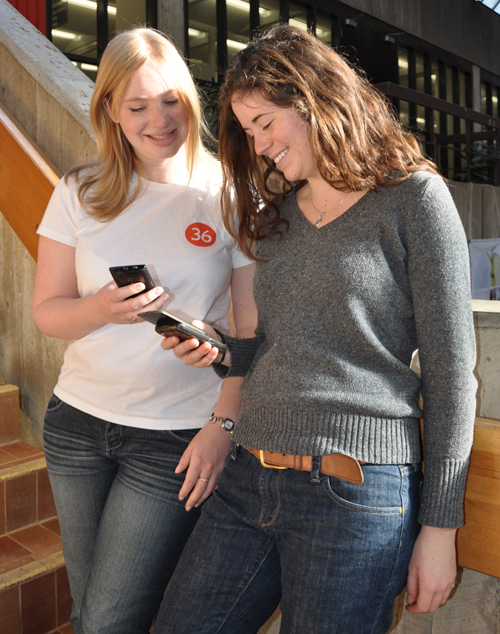
Two University of Guelph students are among 36 exceptional undergraduates selected nationwide to participate in The Next 36, a competitive program that blends real-world business training and experience to give future entrepreneurs a step up on the corporate ladder.
Gracen Johnson, a fourth-year international development student, and Rachel Vriezen, a second-year student majoring in international development and economics, were each awarded a $25,000-scholarship from the program. They will also receive training and mentoring from some of Canada’s top business leaders and entrepreneurs.
Unlike the Apprentice, no one gets fired and everyone wins in the Next 36.
“The prize is getting to do it,” says Johnson.
As international development students, Johnson and Vriezen bring their own unique perspective to a program in which many of the students come from business or computer science backgrounds. Just like their fellow competitors, their achievements both inside and outside the classroom have provided them with a diverse set of skills and experience that will be put to the test.
“I’ve always had an entrepreneurial spirit,” says Johnson, a London, Ont. native, who started an environment and social justice club in high school. She also spearheaded an event called Fill the Hill, which called upon Canadians to bring their concerns about climate change to Parliament Hill as part of the International Day of Climate Action. She hopes to attend Harvard Business School in the future.
For Vriezen, being selected to participate in The Next 36 was “mind-blowing.” The Cambridge, Ont. native is also U of G’s first Pamela Wallin Chancellor’s Scholar, an honour given to a student who demonstrates academic excellence and leadership skills. “I’m absolutely honoured to be given this kind of opportunity,” says Vriezen, who spent several weeks in Ghana last summer to learn about micro entrepreneurs. After pursuing a PhD, she plans to develop a business that would support micro entrepreneurs in Africa.
The Next 36 involves a competitive challenge in which the students are divided into teams of four to develop a mobile app for smartphones. The students will have five months to develop, market and sell their new app with the help of $50,000 in start-up funding, resources and mentorship. The team that develops the best app will be selected by a panel of judges in August.
With tens of thousands of apps already on the market, the challenge will be to develop an original app that appeals to a diverse group of smartphone users, says Johnson.
“One of the things they stress is to take risks when you’re young,” she says, adding that each team has been provided with ample resources, both monetary and mentoring, so that nothing stands in their way as they develop their apps.
The 36 students were chosen in December from more than 1,300 applicants. The intense selection process involved writing essays, providing letters of reference and attending a series of interviews.
In May, the students will begin the academic component of the program, which involves a four-month business boot camp at the University of Toronto, where they will attend lectures and workshops led by Canadian business leaders and internationally renowned faculty.
The Next 36 was developed by a group of academic, business and entrepreneurial leaders, including Ajay Agrawal, an entrepreneurship professor at the University of Toronto; Reza Satchu, entrepreneur and instructor at the University of Toronto; Claudia Hepburn, former managing director of The Fraser Institute’s Ontario office; and Tim Hodgson, special advisor to the Bank of Canada.